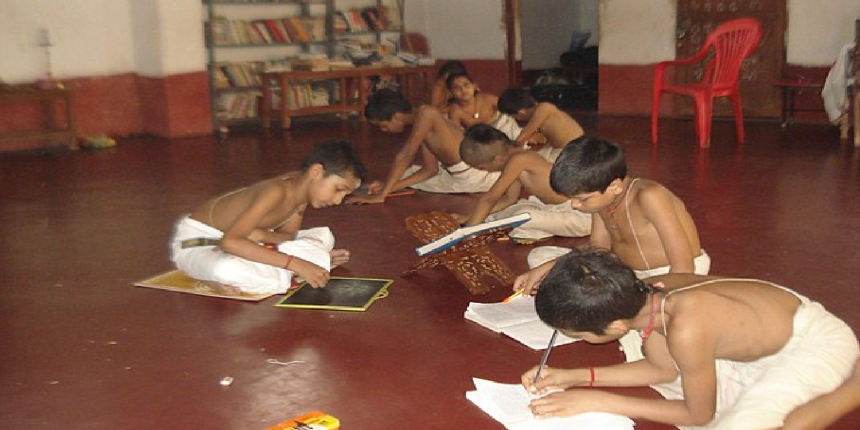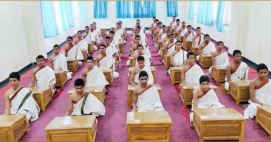Third Rashtriya Adarsh Veda Vidyalaya to start soon in Gujarat’s Dwarka
Sanjay | September 6, 2023 | 11:35 AM IST | 5 mins read
MSRVVP has planned five residential RAVVs across the country. These are free vedic schools funded by the education ministry, affiliated to the Vedic Board.

NEW DELHI: India’s third Rashtriya Adarsh Veda Vidyalaya (RAVV) will start functioning soon from a temporary campus in Gujarat’s Dwarka. In reply to a Right To Information (RTI) application, Maharishi Sandipani Rashtriya Ved Vidya Pratishthan (MSRVVP), an autonomous organisation under the ministry of education, informed that five new campuses of RAVV will function from temporary campuses. The MSRVVP is in the process of acquiring land for the residential schools.
In April 2022, the education ministry approved a proposal for five new RAVVs – or, National Model Vedic Schools – with the objective of spreading knowledge of the Vedas among people.
The first RAVV became operational in the campus of MSRVVP, Ujjain, Madhya Pradesh, from 2018. Union education minister Dharmendra Pradhan had on October 4, 2022 inaugurated the country’s second RAVV in Puri, Odisha. It started functioning from a temporary campus located in the Puri campus of the Central Sanskrit University from the 2022-23 academic year.
MSRVVP Vedic schools
The governing council of MSRVVP and the education ministry have decided to establish RAVVs under the direct management of the autonomous organisation to “improve quality of Veda education” in the country. These are residential schools where all expenses of the students are borne by the central government and accommodation is provided in the hostel.
The RAVVs are being established in five regions – Badrinath in Uttarakhand (North), Sringeri in Karnataka (South), Dwarka in Gujarat (West), Puri in Odisha (East) and Guwahati in Assam (North-East) – under MSRVVP. The RAVVs will have facilities for teaching all four Vedas (Rigveda, Yajurveda, Samaveda and Atharvaveda) along with modern subjects like science, mathematics, social science, computer science, vedic mathematics, English, Sanskrit and Hindi.
“This will provide perfect grooming to the Veda students which will go a long way in producing the ideal citizen that the RAVVs are aiming for. The RAVVs will be a blending method of imparting quality ved[ic] and modern education. This will also help for academic and research expansion in the field of Vedic education throughout the country,” according to MSRVVP.
According to the reply to the RTI questions, filed in May 2023, the first of the five newly-announced RAVVs has started functioning from a temporary campus in Puri. “The academic activities will start soon at the temporary campus” at the third RAVV in Dwarka, Gujarat. The land acquisition process for permanent campuses is on. For the other three RAVVs, MSRVVP is in the process of organising temporary campuses as well as acquiring land for permanent ones. These schools are being set up on the lines of RAVV functioning in Ujjain.
The Adarsh Veda Vidyalaya was conceptualised in 1998. The governing council of the MSRVVP in its meeting held in October 1998 had decided to establish five Adarsh Veda Vidyalayas under its direct control. In the 2020-21 academic year, the governing council recommended the constitution of a committee to examine the plan. In April 2022, the ministry approved the proposal.
MSRVVP has not announced any deadline for the full establishment of the five schools.
Also Read | Concept of equality part of our Vedas, says Rajnath Singh at DU’s Hansraj College
Vedic Board
The MSRVVP set up a board under it with the name of “Maharshi Sandipani Rashtriya Veda Sanskrit Shiksha Board (MSRVSSB)” on August 8, 2022.
Education ministry has recognised the MSRVSSB as a regular school board and the certificates awarded by the MSRVSSB are equivalent to certificates issued by other central and state boards of India for the purpose of admission in higher education institutions and employment. Class 10 is known as Veda Bhushan and Class 12 is called Veda Vibhushan.

In September 2022, All India Council for Technical Education (AICTE) asked vice-chancellors of technical universities and directors, principals of AICTE-approved institutions to consider Veda Bhushan and Veda Vibhushan certifications awarded to candidates by MSRVVP as equivalent to Class 10, 12 certificates issued by the central and state boards.
Union education minister Dharmendra Pradhan on August 2, 2023 informed the Rajya Sabha that the central government will establish five regional-centres of MSRVSSB to promote the formal system of Vedic education. In addition to the board set up in Ujjain, four more regional centres have been planned in the Char Dham across the country and a fifth at Maa Kamakhya Devi Peeth in the north-east.
MSRVVP: Schools and budget
Till April 2022, 16 out of 20 sanctioned posts of teaching and non-teaching staff at the MRRVVP were vacant.
The Pratishthan receives grant-in-aid directly from the education ministry to implement two main schemes – the Veda Pathshala Scheme and the Guru Shishya Parampara Scheme.
The Pratishthan provides financial assistance to Veda Pathashalas or Vidyalayas by way of honorarium to Veda and modern subject teachers, stipend to students and contingent grant under the scheme. It also provides financial assistance by way of honorarium to Veda teachers in Guru Shishya Parampara (GSP) units for “preservation of oral tradition of Vedas”.
Also Read | Expertise in Vedas, Puranas to fetch credits under National Credit Framework
Depending upon their teaching experience duration, Veda teachers’ honorarium per month ranges from Rs 27,500 to Rs 38,500 and modern subject teachers’ monthly honorarium ranges from Rs 25,000 to Rs 35,000 in Veda Pathashalas or Vidyalayas across the country. At GSP units, Veda teachers’ monthly honorarium remains between Rs 25,000 and Rs 35,000 while students receive a stipend of Rs 5,000 per month.
For 2022-23, the budget estimates (BE) for MSRVVP was Rs 1000.58 crore – a 96.6% increase from 2021-22 and 98.4 % from 2020-21.
Vedic school admission
Vedic schools affiliated to MSRVSSB take direct admission in the Classes 7, 10 and 12.
Currently, there are 123 Veda pathshalas across the country where 4,600 students are studying and these have 632 teachers. In 258 Guru Shishya Parampara (GSP) units, there are 2,240 students and 430 teachers.
Also Read | Degree recognition, more funds, NEP 2020: Becoming universities has changed Sanskrit institutions
Admission in Rashtriya Adarsh Veda Vidyalayas (RAVVs) will be based on merit in ‘Veda Bhusan’ fourth (Class 9), ‘Veda Bhusan’ fifth (Class 10), ‘Veda Vibhusan’ first (Class 11) and ‘Veda Vibhusan’ second (Class 12).
“Students studying in Veda Pathshalas and GSP units affiliated to MSRVVP are given admission to RAVVs,” MSRVVP said in RTI reply.
The RAVVs do not charge any fees for admission and students are given traditional dress free of cost.
Follow us for the latest education news on colleges and universities, admission, courses, exams, research, education policies, study abroad and more..
To get in touch, write to us at news@careers360.com.